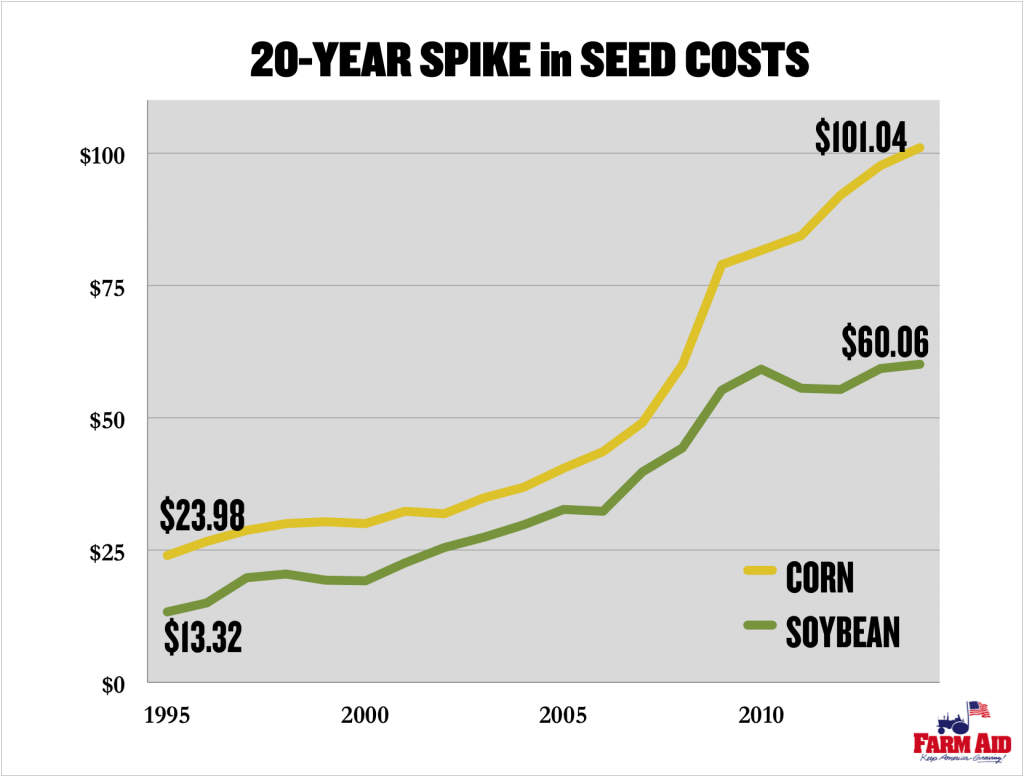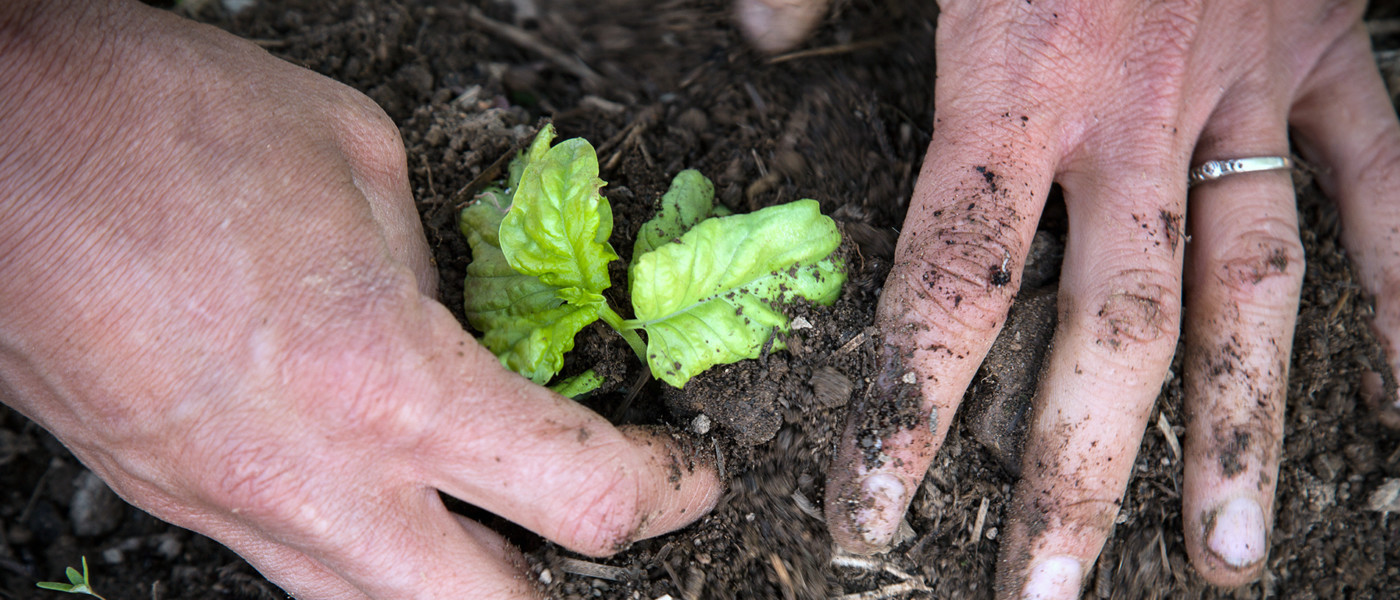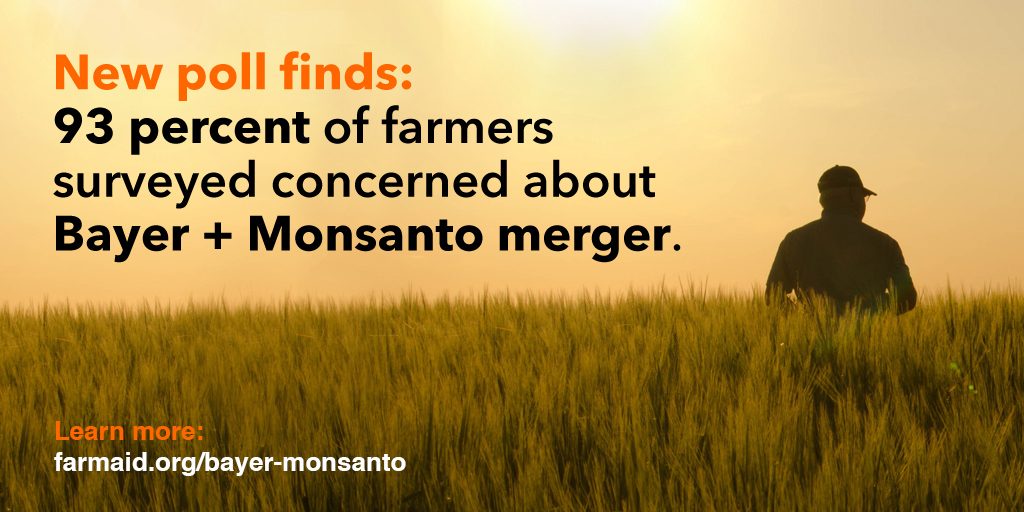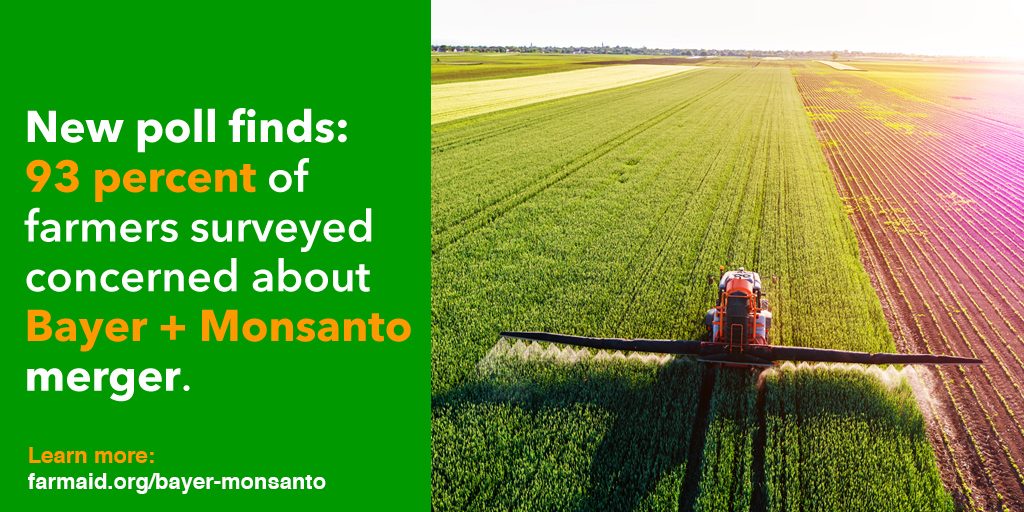Farm Aid is part a large coalition of 45 farm groups that have come together to oppose the proposed merger of Bayer and Monsanto. If the U.S. Department of Justice approves the Bayer-Monsanto merger, the new company would be the world’s largest vegetable seed company, world’s largest cottonseed company, world’s largest manufacturer and seller of herbicides, and the world’s largest owner of intellectual property/patents for herbicide tolerant traits (GMOs).
Why worry? Unchecked corporate power distorts markets and leaves farmers and ranchers vulnerable to abuse and unfair practices. For consumers, unchecked corporate power means higher prices and less choice. Food costs have risen steadily since the 1980s, while the farmer’s share of the retail food dollar has plummeted by 50%. Because of their market power, corporations can push down the prices paid to farmers without passing on their savings to consumers.

Costs for corn and soybean seeds quadrupled between 1995 and 2015.
The coalition of farm groups polled farmers to find out how the proposed merger of Bayer and Monsanto would impact their farm operations. The poll received 957 responses from farmers in 48 states. All together, the farmers who responded to the poll cultivate close to 2 million acres, and represent all sectors of farming.
An overwhelming majority of surveyed farmers are concerned about the proposed merger and believe it will have a negative impact on independent farmers and farming communities.
Top Findings from the Poll
According to the poll, of the farmers who responded:
- 93.7 percent are concerned about the proposed merger of Bayer and Monsanto (82.8 percent are very concerned/10.9 percent somewhat concerned);
- 93.7 percent of farmers are concerned that the proposed Bayer-Monsanto merger will negatively impact independent farmers and farming communities (83.9 percent are very concerned/9.8 percent somewhat concerned);
The farmer’s top three concerns of the merger are:
- 91.9 percent of farmers are concerned that the merged company will use its dominance in one product to push sales of other products (79.6 percent very concerned/12.3 percent somewhat concerned);
- 91.7 percent of farmers concerned that Bayer/Monsanto will control data about farm practices (79.5 percent very concerned/12.2 percent somewhat concerned)
- 89.0 percent of farmers think the merger will result in increased pressure for chemically dependent farming (77.1 percent very concerned/11.9 percent somewhat concerned).
The poll also found a high level of concern amongst farmers surveyed that the merged company will control data about farm practices, will increase prices, diminish quality, choice and seed varieties including availability of regionally adaptive seed, which farmers identified as critical given increasing climate variability.
A white paper, prepared by the Konkurrenz Group, is available below and examines why the U.S. Department of Justice’s Antitrust Division should not accept Bayer’s proposed divestiture and behavioral remedies. Relying on the survey findings and other evidence, the white paper examines why the likely complex behavioral and structural remedies will not likely restore competition in the seed, trait, and pesticide industries.
Voices from Farm Groups
Jennifer Fahy, Communications Director of Farm Aid:
“The chemical-intensive agriculture these corporations promote has given rise to superweeds and a reliance on even more potent, and potentially dangerous, chemicals. The proposed merger of Monsanto and Bayer further strengthens their ability to threaten the development of a sustainable food system that supports independent family farmers and rural economies, meets the growing demand of concerned eaters, and protects our soil and water. If we care about our food and our planet, the time to enforce antitrust laws is now!”
Roger Johnson, President of National Farmers Union:
This survey underscores what we’ve been hearing from our farm family members for decades – that overwhelming consolidation has substantially eliminated competition in the marketplace. Four or five firms dictate the prices that farmers pay for their inputs. Family farmers deserve fair prices, choices in what they plant, and the type of market competition that incentivizes firms to compete and innovate for their business. A Bayer-Monsanto merger stands to move each of these factors in the wrong direction, and that is away from competitive markets. Our survey makes it pretty clear that farmers want the merger blocked.
Joe Maxwell, Executive Director of Organization for Competitive Markets:
The American Dream is built on the core value that family farmers and business men and women should have an opportunity to take their ideas, ingenuity, hard work and resources to the market and have a fair chance at being successful in their endeavors. If allowed, this merger will deny farmers and businesses the ability to have access to seed traits and chemicals that would allow them to differentiate their products in the market, denying consumers the choices they are demanding.
Kiki Hubbard of Organic Seed Alliance:
This merger will further concentrate ownership of our seed supply, inevitably leading to fewer seed variety options in the marketplace, less genetic diversity in our fields, and higher seed prices for farmers. Seed prices have nearly quadrupled in the past 20 years, even though yield and the prices farmers receive for their crops have not. History shows us that mergers of this magnitude also reduce rather than inspire innovation. Mergers of this magnitude therefore affect all farmers, regardless of how they farm, where they farm, and what they grow.
Anne Isakowitsch, Campaign Manager at SumOfUs:
A merger between Bayer and Monsanto would be a massive threat to food supply and farmers around the world. Now that Monsanto and Bayer are closer than ever to this potentially disastrous takeover of our global agricultural system, we must all step up our efforts and speak out. The future of farming and food safety depend on it. This deal has the capability to usher in a new era of sterile crops soaked in dangerous pesticides around the world; we cannot not simply allow this to happen.
Tiffany Finck-Haynes, senior food futures campaigner, Friends of the Earth:
The evidence is overwhelming clear that divestitures or remedies will fail farmers and consumers. We urge the Department of Justice to listen to farmers and the more than 1 million Americans calling on the department to block the Bayer-Monsanto merger. The only answer to this merger is NO.
The Full Results and White Paper
The full results and white paper, which demonstrates that the Department of Justice’s Antitrust Division should reject Bayer’s proposed divestitures and behavioral remedies and say no to this merger is available below:
 Loading...
Loading...
Spread the Word
If you want to post a link to these results on social media, you can use these graphics:





